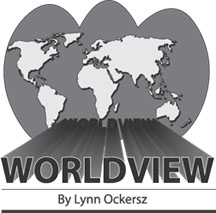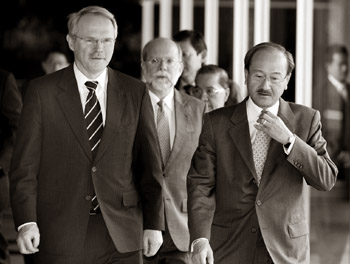Big powers achieving common ground on Asia-Pacific security
 At first glance, the 26-member ASEAN Regional Forum seems a diverse,
heterogenous and contradictory mix of states among whom unity of
perception and purpose would be a near impossibility. At first glance, the 26-member ASEAN Regional Forum seems a diverse,
heterogenous and contradictory mix of states among whom unity of
perception and purpose would be a near impossibility.
However, there is more than meets the eye here. Amid the fissiparous
diversity is a commonality of purpose in the security sphere. In simple
terms, the need for a stable, undisturbed Asia-Pacific region unites
these states and gives the grouping some coherence.
A count of even a few states of the ASEAN Regional Forum, provides a
pointer to its exceptional diversity. Besides the 10 ASEAN members, 16
dialogue partners attend the Forum's deliberations. A handful of them
are: Australia, Bangladesh, Canada, China, the EU, India, Japan, North
Korea, Russia and the US.
It could be seen, then, that besides the mighty and the weak, states
from almost every region of the world enjoy membership of the Forum. In
fact it is a representative cross-section of the "world community."
|

Economics upstaging politics: US Assistant Secretary for East Asian
and Pacific Affairs, Christopher Hill (L) walks with Thai Foreign
Minister, Nitya Pibulsonggram (R) at the Foreign Ministry in
Bangkok, 22 May 2007. Hill is on a two-day visit to the country
prior to heading to Vietnam. AFP
|
Why should this abundant slice of the "world community" have an
abiding interest in a stable, secure Asia-Pacific region? The answer to
this question will unravel the reasons for the recent swift moves by the
Forum to form "a quick-reaction group" to respond to the outbreak of war
and political crises in the Asia-Pacific region.
It will amount to labouring the obvious to emphasize that the
Asia-Pacific region is the principal growth centre of the world economy.
The ASEAN region is the fastest growing "economic zone" of the world.
Besides export-led growth, it boasts a rapidly expanding manufacturing
base and industrial development of substantial proportions.
Besides, the region is witness to growing affluence. It abounds with
electronic and technological giants with the ASEAN coming to the notice
of the world around 25 years ago on account of its "Leaping Tiger"
economies.
Therefore, the Asia-Pacific region is too precious from the viewpoint
of the number one economic powers to be left at the mercy of conflict,
war and terror. If economic penetration of the Asia-Pacific is to go on
unhindered by these powers, then peace and stability in the region needs
to be maintained through an appropriate, cooperative mechanism among
them.
This is the principal reason for the reported formation of the
rapid-reaction group of the ASEAN Regional Forum. The idea is to nip
conflict and war in the bud through a quick, cooperative conflict-defusion
effort.
The inevitable question is: how come states as disparate in political
orientation as China, the US, Russia, India and Japan, for instance, are
arriving at a commonality of purpose on these issues?
The answer has to be sought in economic expansion and commercial
success. On these questions, these seemingly disparate states are all
agreed. The economy "is the thing" and in the current globalised
economy, continued economic penetration of the world becomes a recipe
for national success. Hence their banding together to ensure security.
If this agenda is to be propelled without interruption, conflict and
crisis needs to be kept at a minimum.
This is the reason why the ASEAN Regional Forum would prefer to get
its act together on the security front. One is reminded, once again,
that economics could very well be driving politics. In this the age of
globalisation, economic forces are proving to be more decisive than
political forces.
The common need for economic advancement and the urge to conquer
markets, could act as a catalyst for unity of purpose among the
principal powers.
It does not follow from the above that we are about to witness a
ceasing of political conflicts among states and blocs.
Competition for global hegemonic influence among these actors would
continue but these contests among the world's foremost economic powers
are likely to be devoid of ideological content, for, we do not have
ideological polarities of the Cold War kind any longer. But national
power would continue to be a decisive factor in the power consolidation
calculations of most big powers. This would continue to be a source of
friction among states.
However, some chief ideological polarities in the current global
political economy would be increasingly derived from the forces of
religious extremism and those claiming to be liberal democratic in
outlook. This in fact is likely to emerge as a fundamental polarity in
the world order currently taking shape.
[email protected]
|
